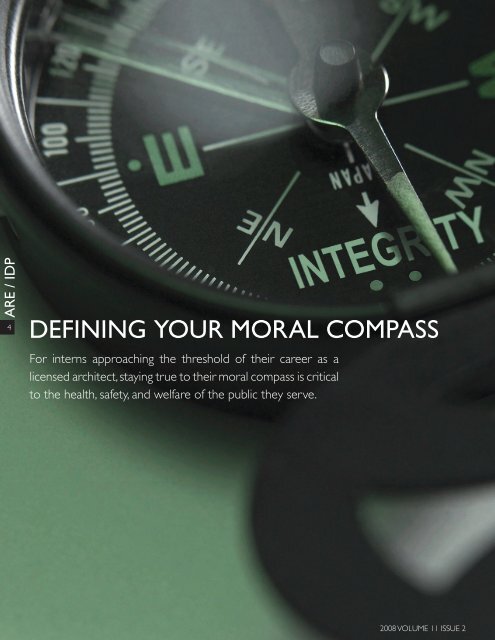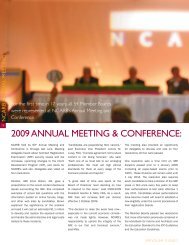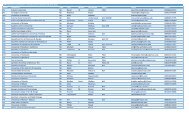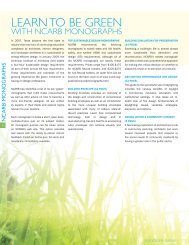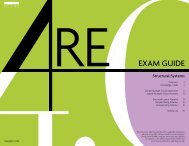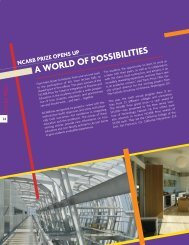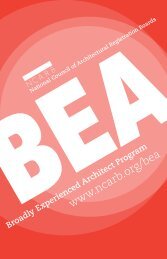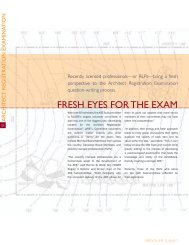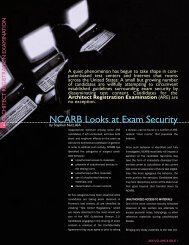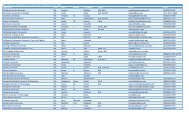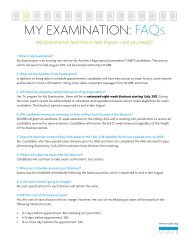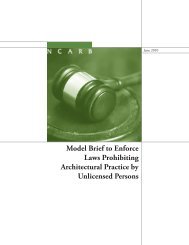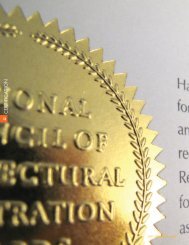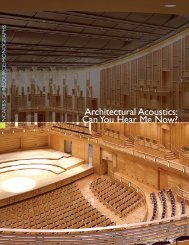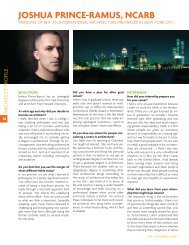dEFiNiNg YouR moRAL ComPASS - NCARB
dEFiNiNg YouR moRAL ComPASS - NCARB
dEFiNiNg YouR moRAL ComPASS - NCARB
Create successful ePaper yourself
Turn your PDF publications into a flip-book with our unique Google optimized e-Paper software.
ARE / IDP<br />
4<br />
Defining Your Moral Compass<br />
For interns approaching the threshold of their career as a<br />
licensed architect, staying true to their moral compass is critical<br />
to the health, safety, and welfare of the public they serve.<br />
2008 Volume 11 Issue 2
“Architects must zealously guard their reputation for integrity,<br />
and a review of some of the basic principles of<br />
ethics, personal and professional, is vital to one’s career,<br />
especially as one enters practice.”<br />
— George Wright, FAIA.*<br />
As professionals, architects are expected<br />
to develop a moral compass by which they<br />
navigate ethical dilemmas that arise in<br />
professional practice. These dilemmas exist<br />
in every facet of practice—from how to handle<br />
challenging client situations to interpreting<br />
life-safety codes. This commitment to ethical<br />
and honest practice is mandated by the<br />
profession’s responsibility to protect the<br />
health, safety, and welfare of the public.<br />
For interns approaching the threshold of<br />
their career as a licensed architect, staying<br />
true to their moral compass is critical to the<br />
health, safety, and welfare of the public they<br />
serve. The process of becoming licensed<br />
offers numerous opportunities for interns to<br />
demonstrate their moral maturity by adhering<br />
to rules established for education, internship,<br />
and examination. The integrity of the<br />
educational process is the responsibility of<br />
the institution granting the degree. However,<br />
the integrity of the internship and examination<br />
components is the responsibility of the intern<br />
and the profession.<br />
INTERN DEVELOPMENT PROGRAM<br />
The Intern Development Program (IDP) is<br />
a comprehensive training program that<br />
assists interns, as emerging professionals, in<br />
acquiring the discipline, integrity, judgment,<br />
skills, and knowledge necessary to legally<br />
practice architecture independently. Although<br />
IDP is a rigorously structured program, it is<br />
largely based on the honor system.<br />
As part of the program, interns are required to<br />
complete training reports that document their<br />
experience in specific training areas and have<br />
them approved by their supervisors. When<br />
interns submit inaccurate training reports,<br />
they put their supervisor in a compromising<br />
position. Some interns exaggerate their<br />
training hours in an attempt to rush through<br />
the IDP. By doing so they not only shortchange<br />
their own internship experience, they also<br />
devalue the process and ultimately weaken<br />
the profession. By choosing to honestly report<br />
their training experience, interns demonstrate<br />
a commitment to themselves and to the<br />
integrity of the process and the profession.<br />
The responsibility to uphold the IDP extends<br />
beyond the interns, to include supervisors<br />
and mentors. These individuals influence<br />
the quality and effectiveness of each intern’s<br />
experience in the program. By guiding their<br />
interns’ professional development, supervisors<br />
and mentors provide an important service to<br />
the profession.<br />
For many seasoned architects the current<br />
process of becoming licensed is vastly different<br />
than what they went through. However, before<br />
taking on the role of supervisor or mentor, it<br />
is important for them to understand the IDP<br />
process. They need to be familiar with the<br />
training areas and understand how training<br />
requirements are satisfied. Supervisors and<br />
mentors must make time to review their<br />
interns’ progress and help interns develop<br />
ARE / IDP<br />
5<br />
DIRECT CONNECTION: A PUBLICATION OF <strong>NCARB</strong><br />
* From Professional Practice: 101 Business Strategies and Case Studies in Architecture<br />
(John Wiley & Sons, Inc., 2006) by Andrew Pressman, FAIA
a plan to complete the program in a timely<br />
fashion. Ultimately, supervisors and mentors<br />
must be accessible to their interns and<br />
committed to the IDP process.<br />
ARE and your moral compass<br />
Before taking any division of the ARE, candidates are required to accept a<br />
confidentiality statement, which prohibits any disclosure of exam content before,<br />
during, or after the exam.<br />
A training program based on an honor system<br />
of self-evaluation can only be as worthwhile<br />
as each participant chooses to make it.<br />
Interns, supervisors, and mentors have an<br />
opportunity to show their dedication to the<br />
future of the profession of architecture and<br />
the integrity of the registration process by<br />
taking IDP seriously. Interns who inaccurately<br />
report their training or supervisors who blindly<br />
sign training reports undermine the program<br />
and the quality of the internship experience,<br />
which can ultimately endanger the public’s<br />
confidence in the profession.<br />
ARE / IDP<br />
6<br />
ARCHITECT REGISTRATION EXAMINATION<br />
The Architect Registration Examination ®<br />
(ARE ® ) is designed to protect the health,<br />
safety, and welfare of the public by providing<br />
a psychometrically justifiable and legally<br />
defensible process that measures the<br />
level of competency necessary to practice<br />
independently. To become licensed,<br />
candidates must pass multiple divisions that<br />
test their ability to perform many of the tasks<br />
an architect encounters in practice.<br />
Policy Regarding Cheating and Disclosure<br />
Adopted by Board of Directors April 2005<br />
That staff and counsel be authorized to investigate alleged cheating and<br />
attempts to disclose the substance of ARE questions and to take appropriate<br />
action. Such action may include holding scores and suspension of future ARE<br />
testing privileges pending resolution of the matter and, with the approval of the<br />
president, commencing legal action against any person threatening the integrity<br />
of the ARE; and<br />
That such actions may include referral of the matter to the Committee<br />
on Professional Conduct for its recommendation to the Board. Such<br />
recommendations may include the cancellation of ARE scores and the<br />
suspension of future ARE testing for up to three years from <strong>NCARB</strong>’s discovery<br />
of the incident, or such longer period as may be warranted in exceptional<br />
circumstances; and in appropriate circumstances seeking recovery of costs and<br />
civil damages in a court of law; and<br />
That the Member Board making such individual eligible for the ARE be informed<br />
of <strong>NCARB</strong>’s action and that such action be retained in records maintained by<br />
<strong>NCARB</strong> with respect to such individual.<br />
Passing a professional exam—like the Bar,<br />
the National Medical Licensing Exam, and<br />
the ARE—can be a daunting task. However,<br />
upholding the integrity of these exams<br />
is essential to the process of becoming<br />
a licensed attorney, doctor, or architect.<br />
Candidates who sit for the ARE agree to the<br />
rules by which it is administered. These rules,<br />
clearly spelled out in the ARE Guidelines,<br />
include: test center regulations, grounds for<br />
dismissal, the Confidentiality Agreement,<br />
and the <strong>NCARB</strong> Board of Directors’ Policy on<br />
Disclosure and Cheating. The consequences<br />
of violating the rules are expressly spelled<br />
in the Confidentiality Agreement, which<br />
candidates must accept prior to the delivery<br />
of every ARE division.<br />
The vast majority of people who take the ARE<br />
respect and abide by the rules. Unfortunately,<br />
there are some candidates who choose to<br />
disregard the Confidentiality Agreement by<br />
sharing content and/or questions from their<br />
exam with other test takers. Since 2005, seven<br />
2008 Volume 11 Issue 2
people have had testing privileges suspended<br />
and scores cancelled for dissemination of<br />
exam content. In recent months, several<br />
additional candidates have been investigated.<br />
At least two cases have been referred to<br />
<strong>NCARB</strong>’s Committee on Professional Conduct.<br />
The review of other cases is ongoing and may<br />
result in further sanctions.<br />
The integrity of the ARE is challenged on a daily<br />
basis by the dissemination of exam content.<br />
Potential violations of the Confidentiality<br />
Agreement are most evident in internet chat<br />
rooms. Thousands of people participate in<br />
internet discussions relating to the ARE.<br />
When used appropriately, the internet is an<br />
excellent tool for gathering study resources<br />
and bonding with fellow candidates about test<br />
center experiences. It is also, however, a place<br />
where rules that are written in black and white<br />
become dangerously grey.<br />
One area of particular concern is the assembly<br />
of a “master list” that outlines material covered<br />
in the exam. Study guides are a valuable<br />
resource for exam candidates. However,<br />
lists that disclose specific exam content<br />
are unacceptable. Inappropriate disclosure<br />
of exam content is not limited to divulging<br />
information from one’s personal experience.<br />
Many internet posts are a compilation of<br />
ARE information originally provided by other<br />
candidates. If this information includes exam<br />
content, then the reposting of this information<br />
is potentially a violation of the Confidentiality<br />
Agreement—whether it occurs “before, during,<br />
or after the exam.”<br />
There is also the ongoing question about<br />
“paraphrasing.” How much is too much<br />
information? The answer is clear. Any specific<br />
information that identifies the nature of<br />
a question is not allowed. This includes<br />
disclosing or inferring specific vocabulary and<br />
exam content. Candidates should limit their<br />
post-exam discussions to general terms about<br />
the experience itself and avoid all references<br />
to exam content.<br />
Additionally, people should not ask someone<br />
“to be more specific” about their exam<br />
experience—and candidates must not<br />
elaborate when they are asked. These types<br />
of questions should raise concern among<br />
test-takers who are serious about the ethical<br />
implications of being a professional.<br />
After years of education and training, the<br />
number of candidates willing to risk their<br />
career in architecture for associates they meet<br />
in internet chat rooms is alarming. To protect<br />
themselves, people who post on the internet<br />
should consider the character of those they<br />
correspond with and carefully think about the<br />
potential consequences of their interactions.<br />
Candidates who value the online chat rooms<br />
must demonstrate their professional integrity<br />
and police their own. It should not be necessary<br />
for <strong>NCARB</strong> to “police” the internet for possible<br />
dissemination of exam content.<br />
Any action that compromises the ARE ultimately<br />
undermines the health, safety, and welfare of the public.<br />
The ARE is a vital component of the process<br />
by which <strong>NCARB</strong>’s Member Boards qualify<br />
architects to practice in their jurisdictions. Any<br />
action that compromises the ARE ultimately<br />
undermines the health, safety, and welfare of<br />
the public.<br />
As a profession, there is an expectation of<br />
honest and ethical practice. This expectation<br />
extends to those pursuing a license. Whether<br />
enrolled in IDP, supervising or mentoring<br />
an intern, or a candidate for the ARE, each<br />
individual must define their own moral<br />
compass and adhere to the highest levels of<br />
ethical and professional behavior. DC<br />
IDP and your<br />
Moral Compass<br />
When interns submit their<br />
Employment Verification Forms<br />
they must sign a statement<br />
certifying that all information<br />
is correct:<br />
“I hereby authorize <strong>NCARB</strong> to<br />
make inquiries of the person<br />
listed below with respect to<br />
my background and character.<br />
I invite full and complete<br />
response to all inquiries. I<br />
release said person from any<br />
and all claims, including claims<br />
for libel and slander, which may<br />
arise out of the communication<br />
of any information to <strong>NCARB</strong>.<br />
I hereby certify that all<br />
information I furnish herein or<br />
attached hereto is correct.”<br />
IDP Infractions<br />
and<br />
Consequences<br />
When interns submit reports<br />
that misrepresent their<br />
employment duration, training<br />
units, and/or training settings,<br />
they commit an IDP infraction.<br />
Supervisor infractions include<br />
refusing to certify training<br />
reports without cause and<br />
certifying reports that contain<br />
false information.<br />
At a minimum, the<br />
consequence of submitting an<br />
inaccurate report could result<br />
in the loss of training units.<br />
Depending on the severity<br />
of the infraction, the case<br />
may be referred to <strong>NCARB</strong>’s<br />
Committee on Professional<br />
Conduct.<br />
ARE / IDP<br />
7<br />
DIRECT CONNECTION: A PUBLICATION OF <strong>NCARB</strong>


